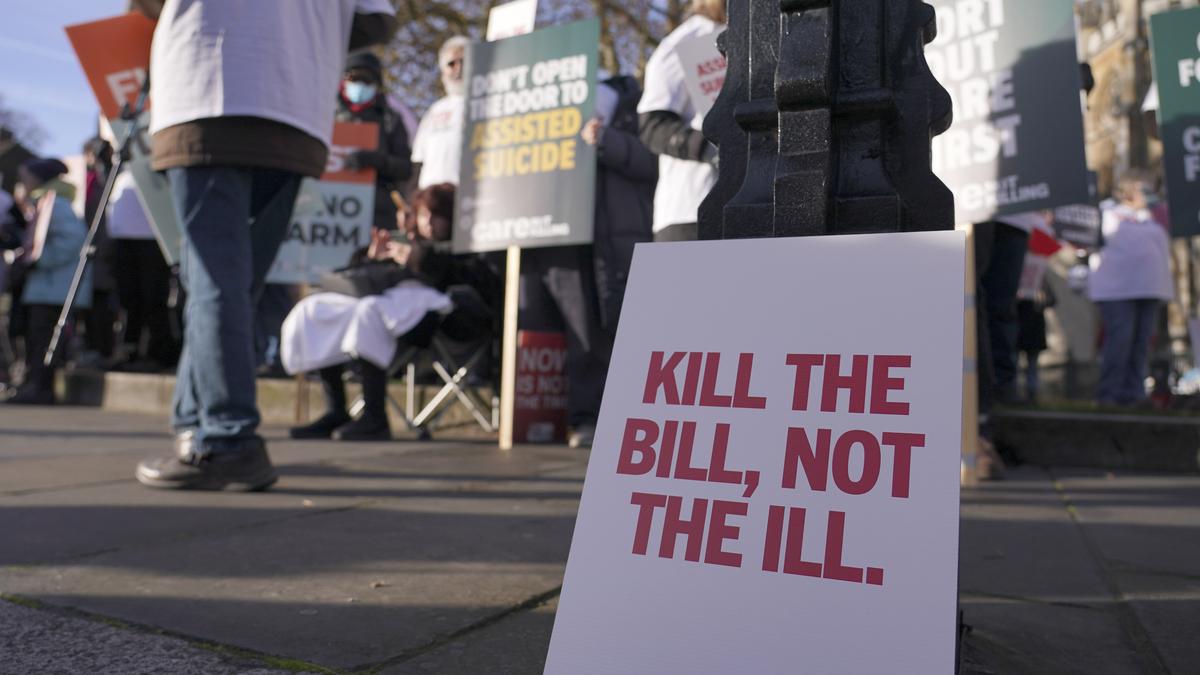
Should assisted dying be legalised in U.K.? | Explained Premium
The Hindu
Britain's House of Commons votes to legalize assisted dying, sparking debate on ethics, compassion, and societal implications.
The story so far:
Britain’s House of Commons on November 29 voted by a majority to legalise assisted dying — a less controversial synonym for assisted suicide in England and Wales. The step signals a seismic social shift on an emotive issue. Advocates regard the new Bill as a humane and compassionate intervention that should — for those who want to exercise the option — bring closure to a painful, debilitating and degrading dependence on the immediate family. Opponents, who include the head of the Church of England, are apprehensive that the severely disabled and vulnerable patients may feel forced to end their lives to relieve the burden on relatives. “It should never become easier to seek help to die than to live,” they say. The debate on the Bill’s merits has also brought to the fore concerns that the delivery of hospice and palliative care services could be undermined. Portrayed sometimes as a “Give us our last rights” campaign, about 75% of the public has backed the liberalisation of assisted dying, as per a U.K. National Centre for Social Research survey.
The U.K. courts have time and again maintained that given the sensitive ethical, philosophical, and social questions involved, the subject of assisted dying was not a matter on which the judiciary could pronounce a decision based on concrete evidence. Successive British governments have similarly maintained that any change to existing law was for parliament to consider and a matter of their conscience for individual MPs and that the government would officially adopt a neutral stance. The Terminally Ill Adults (end of life) legislation was thus brought forward as a private member Bill by the Labour MP Kim Leadbeater. Among its supporters were Prime Minister Keir Starmer, the Home Secretary, the chancellor of the exchequer, and the Opposition leader Rishi Sunak. Six Cabinet Ministers opposed the proposal.
Suicide, (self-inflicted death), or attempted suicide are not in themselves criminal offences in England and Wales. Conversely, an act that encourages or assists a person to commit suicide or attempted suicide is a criminal offence that carries a 14-year prison sentence under the 1961 Assistive Suicide Act.
The Bill before parliament seeks to give terminally ill, mentally competent adults who have less than six months to live — which assumes that a reliable method exists of forecasting survival — the option to end their life. Under one stipulation, any such request must be authorised by two doctors and a High Court judge.
Since 2001, severely disabled applicants have petitioned the U.K. courts that the 1961 law, as well as the prosecution’s refusal to allow them to end their lives under medical assistance, was incompatible with their rights under the European Convention on Human Rights (ECHR). At issue was the right to life (Article 2), which the petitioners viewed as entailing the right to self-determination and an entitlement to end life with assistance. They have also argued that the denial of the option to die with assistance — insofar as it failed to alleviate suffering — amounted to cruel and degrading treatment prescribed under Article 3. It moreover constituted an infringement of the right to privacy and freedom of conscience enshrined in Articles 8 and 9. Finally, as persons with disabilities who needed assistance to end their lives, the denial of permission by the prosecution amounted to discrimination, in breach of Article 14 of the ECHR.
The U.K. House of Lords in 2002 unanimously overruled these contentions. But, in a 2014 Supreme Court decision, the majority opined that although the 1961 law was incompatible with the rights of two incurably suffering but not terminally ill petitioners, it was for parliament to modify the law. In 2015, the European Court of Human Rights ruled that the U.K. Supreme Court was under no obligation to examine the merits of a challenge to primary legislation and that Britain’s government was open to concluding that this was a matter for parliament to arrive at a suitable determination. It is thus crystal clear that only new legislation can alter the status quo in this matter.











